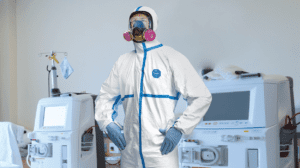
Proper PPE is critical in the fight to stop the spread of disease (Image Source: DuPont)
In response to the COVID-19 crisis affecting the globe, companies of the chemical process industries (CPI) are adjusting their production slates to meet growing demand for not only sanitizing and disinfection agents, but also critical personal protective equipment (PPE), such as masks, gloves and containment garments. Companies that are shifting their production slate to include hand sanitizers include Ineos, Dow, Henkel, Arkema and more.
INEOS (London) — a producer of the two key raw materials needed for sanitizers, isopropyl alcohol (IPA) and ethanol — announced plans to build a U.K. factory to produce 1 million bottles of hand-sanitizing gel per month within 10 days, and will replicate this same plan in Germany. The company says its sanitizing products will be issued free of charge to hospitals.
Dow (Midland, Mich.) assessed its capability to manufacture hand sanitizers at its facilities in Germany. The Stade site in Lower Saxony was identified as having the necessary raw material handling, mixing, and bulk packaging equipment to conduct hand sanitizer production.
Since Friday, March 20, up to 15 tons of hand sanitizers have been produced daily – representing a monthly production capacity of approximately 300 tons. The disinfectant is filled into Intermediate Bulk Containers (IBC) and will then be made available to government authorities for distribution to pharmacies and hospitals free of charge. The first deliveries will primarily go to the most urgently needed places in the district of Stade, but also to other regions, including Berlin. In addition, further quantities of raw materials for hand sanitizers will also be produced in the coming weeks, which can then be delivered to around 377 clinics throughout Germany.
Dow does not regularly produce hand sanitizer, but a large proportion of the required ingredients are already produced at the company’s German sites. The company intends to continue producing these and providing it to hospitals and pharmacies in need until the COVID-19 pandemic subsides or until disinfectants are no longer in short supply in Germany.
At its manufacturing site in Monthey, Switzerland, Huntsman Corp. (The Woodlands, Tex.) announced it will produce approximately 50 tons of hand sanitizer to donate free of charge to hospitals and pharmacies, which are now facing increasing shortages due to the COVID-19 pandemic and constrained supply of the product.
The first shipment of five tons is expected to be delivered immediately. More production is planned to ensure a stable supply of between three tons and five tons per week as required to help safeguard medical staff, patients and the public.
In recent weeks, Huntsman also contributed its chemical products to the fight against the coronavirus COVID-19 in China. The company donated methylene diphenyl diisocyanate (MDI) for the manufacture of prefabricated polyurethane insulation panels for hospital construction, as well as other essential materials to manufacture personal protective equipment (PPE) for medical personnel fighting the coronavirus.
Proper PPE is critical for healthcare workers to help treat patients and slow the spread of disease. Honeywell (Charlotte, N.C.; www.honeywell.com) has quickly ramped up its production of N95 respiratory masks by expanding manufacturing capabilities in a factory in Smithfield, Rhode Island, which also produces UVEX safety glasses. The N95 face masks will be delivered to the U.S. Department of Health and Human Services for use to support health, safety and emergency response workers.
Honeywell expects the new mask-production line in Smithfield will create at least 500 jobs. Recruiting, hiring and training manufacturing workers will begin immediately.
DuPont (Wilmington, Del.; www.dupont.com) has also said that it is working to increase its manufacturing facilities that produce protective garments during this time of extremely high demand. The company says it has significantly increased production of the most requested Tyvek garments, but even with these efforts, total Tyvek garment demand continues to increase significantly.
Milliken & Co. (Spartanburg, S.C.; www.milliken.com) has also announced plans to increase production of its antimicrobial fabric products.